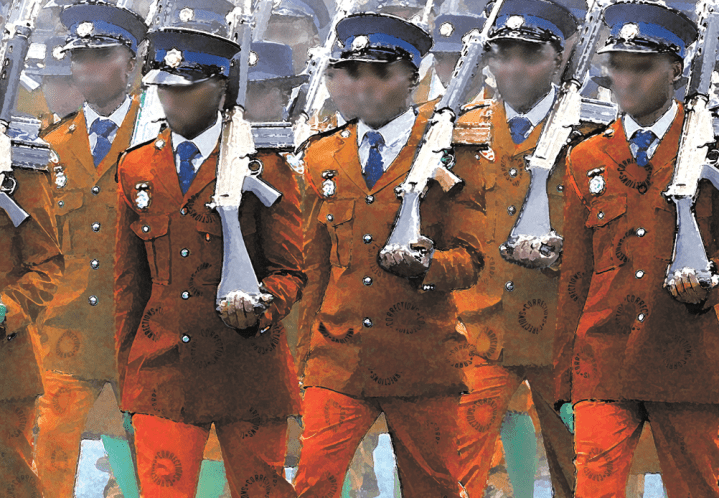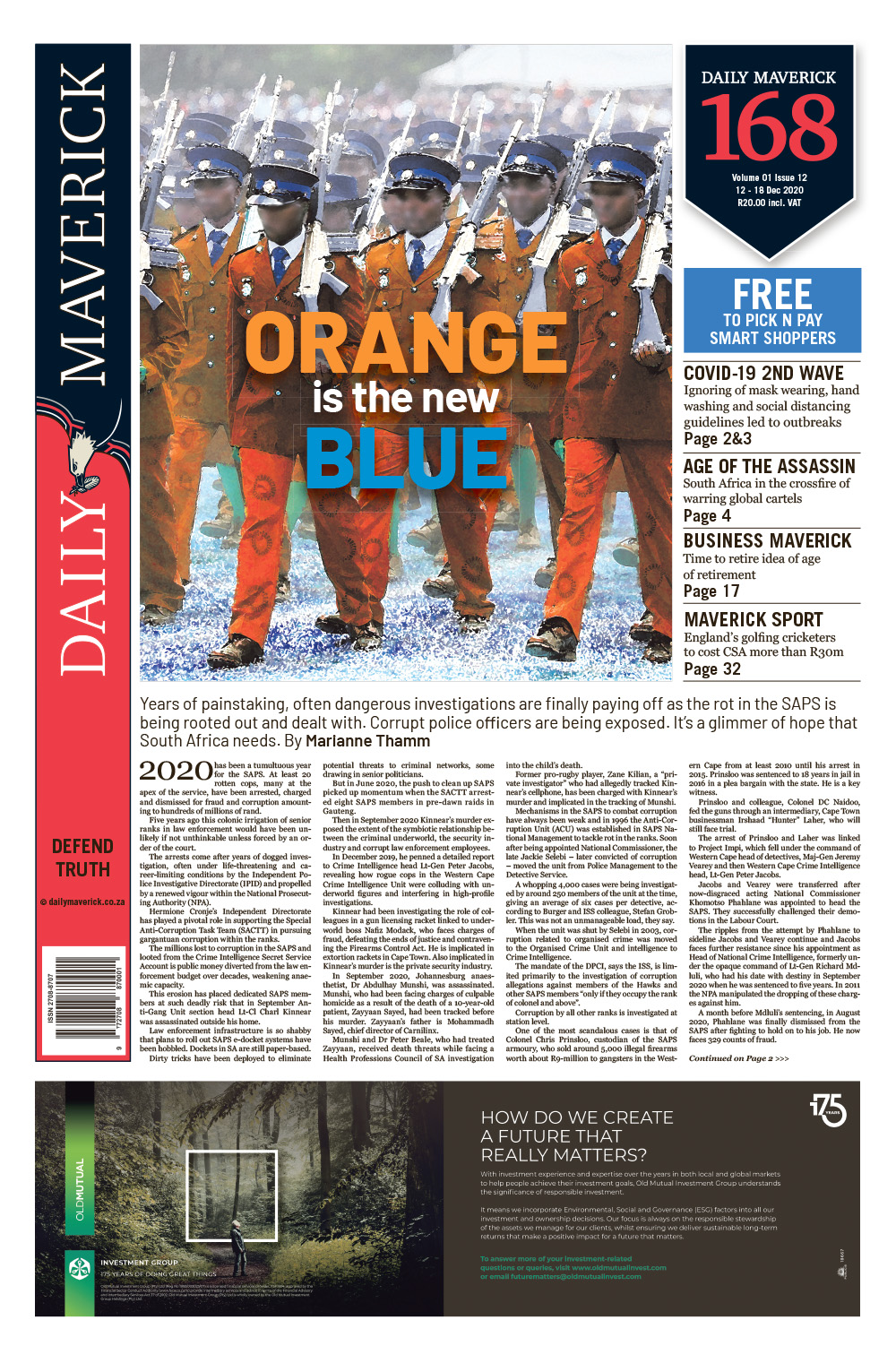Daily Maverick 168
Orange is the new blue: Finally, a reckoning for corrupt cops

Years of painstaking, often dangerous investigations are paying off as the rot in the SAPS is being rooted out and dealt with. Corrupt police officers are being exposed. It’s a glimmer of hope that South Africa needs.
First published in the Daily Maverick 168 weekly newspaper.
2020 has been a tumultuous year for the SAPS. At least 20 rotten cops, many at the apex of the service, have been arrested, charged and dismissed for fraud and corruption amounting to hundreds of millions of rand.
Five years ago this colonic irrigation of senior ranks in law enforcement would have been unlikely if not unthinkable unless forced by an order of the court.
The arrests come after years of dogged investigation, often under life-threatening and career-limiting conditions by the Independent Police Investigative Directorate (IPID) and propelled by a renewed vigour within the National Prosecuting Authority (NPA).
Hermione Cronje’s Independent Directorate has played a pivotal role in supporting the Special Anti-Corruption Task Team (SACTT) in pursuing gargantuan corruption within the ranks.
The millions lost to corruption in the SAPS and looted from the Crime Intelligence Secret Service Account is public money diverted from the law enforcement budget over decades, weakening anaemic capacity.
This erosion has placed dedicated SAPS members at such deadly risk that in September Anti-Gang Unit section head Lt-Cl Charl Kinnear was assassinated outside his home.
Law enforcement infrastructure is so shabby that plans to roll out SAPS e-docket systems have been hobbled. Dockets in SA are still paper-based.
Dirty tricks have been deployed to eliminate potential threats to criminal networks, some drawing in senior politicians.
But in June 2020, the push to clean up SAPS picked up momentum when the SACTT arrested eight SAPS members in pre-dawn raids in Gauteng.
Then in September 2020 Kinnear’s murder exposed the extent of the symbiotic relationship between the criminal underworld, the security industry and corrupt law enforcement employees.
In December 2019, he penned a detailed report to Crime Intelligence head Lt-Gen Peter Jacobs, revealing how rogue cops in the Western Cape Crime Intelligence Unit were colluding with underworld figures and interfering in high-profile investigations.
Kinnear had been investigating the role of colleagues in a gun licensing racket linked to underworld boss Nafiz Modack, who faces charges of fraud, defeating the ends of justice and contravening the Firearms Control Act. He is implicated in extortion rackets in Cape Town. Also implicated in Kinnear’s murder is the private security industry.
In September 2020, Johannesburg anaesthetist, Dr Abdulhay Munshi, was assassinated. Munshi, who had been facing charges of culpable homicide as a result of the death of a 10-year-old patient, Zayyaan Sayed, had been tracked before his murder. Zayyaan’s father is Mohammadh Sayed, chief director of Carnilinx.
Munshi and Dr Peter Beale, who had treated Zayyaan, received death threats while facing a Health Professions Council of SA investigation into the child’s death.
Former pro-rugby player, Zane Kilian, a “private investigator” who had allegedly tracked Kinnear’s cellphone, has been charged with Kinnear’s murder and implicated in the tracking of Munshi.
Mechanisms in the SAPS to combat corruption have always been weak and in 1996 the Anti-Corruption Unit (ACU) was established in SAPS National Management to tackle rot in the ranks. Soon after being appointed National Commissioner, the late Jackie Selebi – later convicted of corruption – moved the unit from Police Management to the Detective Service.
A whopping 4,000 cases were being investigated by around 250 members of the unit at the time, giving an average of six cases per detective, according to Burger and ISS colleague, Stefan Grobler. This was not an unmanageable load, they say.
When the unit was shut by Selebi in 2003, corruption related to organised crime was moved to the Organised Crime Unit and intelligence to Crime Intelligence.
The mandate of the DPCI, says the ISS, is limited primarily to the investigation of corruption allegations against members of the Hawks and other SAPS members “only if they occupy the rank of colonel and above”.
Corruption by all other ranks is investigated at station level.
One of the most scandalous cases is that of Colonel Chris Prinsloo, custodian of the SAPS armoury, who sold around 5,000 illegal firearms worth about R9-million to gangsters in the Western Cape from at least 2010 until his arrest in 2015. Prinsloo was sentenced to 18 years in jail in 2016 in a plea bargain with the state. He is a key witness.
Prinsloo and colleague, Colonel DC Naidoo, fed the guns through an intermediary, Cape Town businessman Irshaad “Hunter” Laher, who will still face trial.
The arrest of Prinsloo and Laher was linked to Project Impi, which fell under the command of Western Cape head of detectives, Maj-Gen Jeremy Vearey and then Western Cape Crime Intelligence head, Lt-Gen Peter Jacobs.
Jacobs and Vearey were transferred after now-disgraced acting National Commissioner Khomotso Phahlane was appointed to head the SAPS. They successfully challenged their demotions in the Labour Court.
The ripples from the attempt by Phahlane to sideline Jacobs and Vearey continue and Jacobs faces further resistance since his appointment as Head of National Crime Intelligence, formerly under the opaque command of Lt-Gen Richard Mdluli, who had his date with destiny in September 2020 when he was sentenced to five years. In 2011 the NPA manipulated the dropping of these charges against him.
On 9 December 2020, former Crime Intelligence Chief Financial Officer Major-General Solomon Lazarus was sentenced in the Pretoria regional court to 10 years on charges of fraud and corruption. Lazarus was convicted of corruption worth more than R200,000.
A month before Mdluli’s sentencing, in August 2020, Phahlane was finally dismissed from the SAPS after fighting to hold on to his job. He now faces 329 counts of fraud.
Joining Phahlane in the dock are former Gauteng police chief General Deliwe de Lange; Gauteng’s deputy police commissioner Maj-Gen Nombhuruza Napo, national divisional commissioner for supply chain management, Lt-Gen Ramahlapi Mokwena, and SAPS heads of procurement Brigadiers Ravi Pillay and James Ramanjalum.
In October, South African’s second-most senior police chief, Lt-Gen Bonang Mgwenya, appeared on charges of corruption, fraud, theft and money laundering involving about R200-million. She has been dismissed from the service. Also in October, former KZN Provincial Commissioner Mmamonnye Ngobeni faced charges of corruption related to a 2010 R47-million World Cup SAPS accommodation tender scam.
Another SAPS senior official, Captain Ashwin Narainpershad, appeared alongside Ngobeni in the matter.
In November 2020, after 14 years of lingering in legal limbo, former SAPS Northwest Deputy Commissioner Major-General Jan Mabula found himself facing charges of extortion, kidnapping and assault with intent to do grievous bodily harm.
Mabula, leader of a notorious North West team dispatched to deal with targets including IPID, its former head Robert McBride, and forensic investigator Paul O’Sullivan, is accused of acting like a political “hit squad”.
Mabula was part of the politically motivated arrest of KZN Hawks head Booysen and former NPA prosecutor Gerrie Nel.
The matter for which Mabula will now stand trial dates back to a 2006 R14-million robbery of an SAPS store in Benoni.
The SAPS and Crime Intelligence have been implicated in industrial scale fraud and corruption, including allegedly colluding with elements in the ANC to siphon off public funds to buy votes at elective conferences.
On 9 December 2020, former Crime Intelligence Chief Financial Officer Major-General Solomon Lazarus was sentenced in the Pretoria regional court to 10 years on charges of fraud and corruption. Lazarus was convicted of corruption worth more than R200,000.
As CFO of Crime Intelligence, Lazarus was involved in acquiring motor vehicles for the division from Atlantis Motors, a service provider for the front company of Crime Intelligence, Universal Technical Enterprises CC (UTE). Lazarus derived benefits from 2006 to 2011 from various deals.
As minister, Cele has spoken out against corruption in the governing party, of which he is a senior member, and has said he would welcome some of them swapping their suits for orange overalls.
IPID found itself at the centre of a political struggle as its head, McBride, spent years under hostile conditions, gathering evidence against SAPS top brass.
The arrest and charging of so many in the SAPS top leadership can be attributed also to the work of IPID investigators.
However, the Helen Suzman Foundation has expressed concern about the independence of IPID and that it is accountable to the minister of police as a “political head”.
Minister Bheki Cele in August 2020 appointed his preferred candidate, Jennifer Ntlatseng, as IPID executive director, a move subject to a court challenge by the HSF.
Burger opined that the combination of the appointment of Lt-Gen Godfrey Lebeya to head the Hawks in 2018, the appointment of NPA head Shamila Batohi and Hermione Cronje, combined with new legislation, had all been serendipitous. “It was a combination that came at the right time,” said Burger.
SAPS National Commissioner Khehla Sitole, appointed in 2017 by Jacob Zuma, appears to have shown a commitment to President Cyril Ramaphosa’s strong anti-graft stance, remarked Burger.
All of these law enforcement agencies, apart from having to deal with a tsunami of complicated corruption investigations, are riven by deep internal fissures and scars left from the bruising Zuma years. “There is no quick fix,” added Burger.
Can the SAPS be saved?
The criteria for appointing a low-ranking constable to the South African Police Service (SAPS) is far more exhausting and exacting than for the top jobs, such as that of National Commissioner or head of the Directorate for Priority Crime Investigation (DPCI).
When it comes to these crucial posts, the criteria simply suggest the President appoint a “man or a woman” who is deemed suitable. A potential constable, on the other hand, has to jump through about 18 hoops.
South Africa has had three National Commissioners, all political appointees who have left the post in ignominy: Jackie Selebi (found guilty of corruption); Riah Phiyega (found unfit for office); and Khomotso Phahlane (facing over 300 charges of fraud and corruption).
There was scepticism when Jacob Zuma appointed Khehla Sitole, a policeman who was in finance for most of his career, as National Commissioner in August 2017. Prior to this, Sitole was the Divisional Commissioner for Protection and Security Services.
“His late exposure to operational issues was a concern but since the appointment of [President] Cyril Ramaphosa, it appears Sitole is adhering to the direction the President has taken in opposition to corruption,” said Johan Burger, a consultant with the Institute for Security Studies (ISS).
In September 2020, Police Minister Bheki Cele announced that his ministry welcomed Cabinet’s approval of the SAPS Amendment Bill 2020, which has been published for comment. While it will take time to work its way into law, it is hoped it will contribute towards creating a more stable SAPS.
The amendments aim to eliminate weaknesses in the legal framework governing the police service, including poor vetting, a lack of “integrity testing”, as well as lax mechanisms to counter conflicts of interest. The amendments also seek to compel SAPS recruits to supply a DNA sample.
The National Development Plan 2030 (NDP), which encompasses a vision of a future SAPS, acknowledges that the crises in SAPS top management have had a consistent negative impact on service delivery and on the SAPS itself. The NDP recommends that top positions should be filled on a competitive basis through a national policing board or body, which will set and regulate standards.
The top candidate would then be appointed by the President from a list of “appropriately skilled professionals”. All officers would undergo “competency assessment to gauge whether they met required standards”.
The situation as it currently exists “cannot continue”, said Burger.
Cele: Maverick or madman?
Bheki Cele, who was appointed Minister of Police in 2018, is generally viewed by experts in the field as a man “with his heart in the right place” who is seeking solutions. He is generally liked and respected by the rank and file in SAPS, who respond warmly to Cele’s commitment to members and willingness to engage.
During his tenure, renewed by Ramaphosa, Cele has consulted widely with law-enforcement veterans and specialists, some of whom were previously purged from the ranks, about the situation in all divisions of the SAPS and the Hawks. This was a welcome change, said Burger, to the attitude of previous ministers. Cele is not new to the terrain, having served as National Commissioner from 2009 (replacing Jackie Selebi) before he was dismissed in 2012. But he inherited a deeply troubled service from his Zuma-era predecessors Nathi Mthethwa and Nathi Nhleko.
Cele is the political head of a vast organisation and, while it is riddled with rot, corruption and ill-discipline, this does not apply to every member of the 192,277-strong service.
The private security industry, by contrast, has 450,000 private security guards and 1.5 million “qualified but inactive” members.
Irregular expenditure in the SAPS remains a major headache with R996-million posted for 2018/19 – a 3,000% increase from the R33-million lost in the 2017/18 financial year. Corruption Watch’s 2019 report showed police corruption outstripped any other government sector. Leading culprits were abuse of power (35.7%) and bribery (30.6%).
The major clean-up of SAPS has begun to extricate the rot, and from the top down.
“The impact of the network of patronage within the SAPS frequently protects those engaged in corrupt activities, but makes more vulnerable those trying to expose corruption in this critical sector,” Corruption Watch said.
As minister, Cele has spoken out against corruption in the governing party, of which he is a senior member, and has said he would welcome some of them swapping their suits for orange overalls.
In September 2019, Cele was implicated by crime intelligence official turned state witness Dhanajaya Naidoo at the Zondo Commission of Inquiry. Naidoo and Hawks investigator Kobus Roelofse testified that, in late 2010, crime intelligence went through a restructuring process “which would have an effect on appointments”. The man who signed off on the restructuring was Cele, then police commissioner.
Cele responded, saying he deemed parts of Naidoo’s testimony as “illogical” and without basis. DM168
Only a select few ground-breaking Daily Maverick 168 stories are published on our website. For all the most important stories of the week, get your copy of the Daily Maverick 168 newspaper at these Pick n Pay stores.



















 Become an Insider
Become an Insider
Comments - Please login in order to comment.